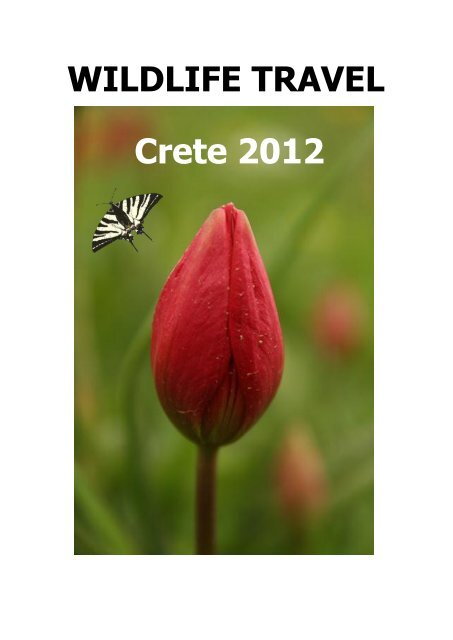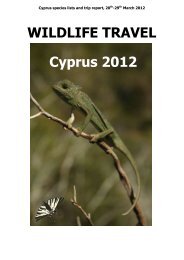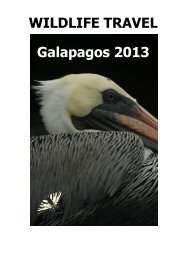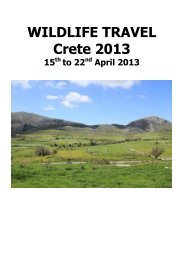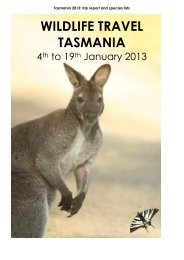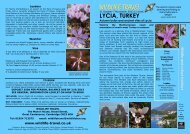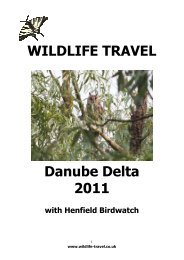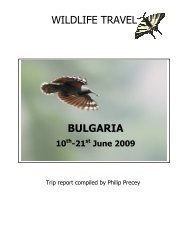You also want an ePaper? Increase the reach of your titles
YUMPU automatically turns print PDFs into web optimized ePapers that Google loves.
WILDLIFE TRAVEL<br />
Crete <strong>2012</strong>
Crete species lists and trip report, 17 th to 24 th <strong>April</strong> <strong>2012</strong><br />
# DATE LOCATIONS & NOTES<br />
1 17 th <strong>April</strong> London to Chania. Agia Reservoir, then to Plakias Bay Hotel<br />
2 18 th <strong>April</strong> lanes around Plakias<br />
3 19 th <strong>April</strong> Spili ‘bumps’<br />
4 20 th <strong>April</strong> Preveli Monastery and Kourtaliotiko Gorge<br />
5 21 st <strong>April</strong> Mirthios<br />
6 22 nd <strong>April</strong> Festos and Agia Triada<br />
7 23 rd <strong>April</strong> Frangokastello Castle and Imbrou Gorge<br />
8 24 th <strong>April</strong> Return to UK<br />
Leaders<br />
Philip Precey: <strong>Wildlife</strong> <strong>Travel</strong><br />
Yiannis Christofides: Cyprus<br />
A gallery of some of Philip’s photos from the holiday can be seen on <strong>Wildlife</strong> <strong>Travel</strong>’s Flickr site, at<br />
http://www.flickr.com/photos/wildlifetravel/sets/72157629503611254/<br />
www.wildlife-travel.co.uk<br />
2
Crete species lists and trip report, 17 th to 24 th <strong>April</strong> <strong>2012</strong><br />
17 th <strong>April</strong>. Arrival and Agia Reservoir. An (extremely) early start and an uneventful flight over a cloudcloaked<br />
Europe saw us arrive at Chania Airport just after midday local time. Bags gathered, we boarded<br />
our coach and headed west to Agia Reservoir, with a short stop on the way to gather provisions.<br />
From the patio of a handily-located restaurant, we ate our lunches while checking the birds around the<br />
small reservoir. Coot, Moorhen and Little Grebe predominated, but we did start to pick out some more<br />
interesting species: a couple of Squacco Herons and a Little Egret hunted the edges, a male Ferruginous<br />
Duck hid at the back, 3 Alpine Swifts zoomed overhead and single Glossy Ibis and Black-winged Stilt were<br />
found, but the best were 3 or 4 Little Crakes picking their way over the floating mats of algae.<br />
From here, it was a 2 hour drive across an increasingly windy island to our hotel at Plakias.<br />
18 th <strong>April</strong>. Plakias. Overnight the wind had picked up, and by breakfast the bay was full of white horses<br />
and a sand storm was blowing across the coast road. The howling gale put paid to any plans of walking<br />
around the headland: storm force winds and cliff-top paths don’t generally go well together. So instead we<br />
ambled about the lanes and fields immediately around the hotel and behind Plakias.<br />
Our first introduction to the flora of Crete was a good one (despite the wind!) and included plenty of<br />
interest, including some nice endemics: the lovely yellow and blue hyacinth Muscari spreitzenhoferi on a<br />
sandy patch of hillside; the impressive blue Petromarula pinnata, a member of the Campanulaceae growing<br />
on vegetated rocky slopes behind the village; the white skullcap Scutellaria sieberi. We also found our first<br />
orchids in the form of two species of Tongue Orchids, Serapias bergonii with larger, darker flower spikes<br />
and Serapias parviflora a small-flowered species that nearly always self-fertilises, as well as several spikes<br />
of the dark bee orchid Ophrys gortynia.<br />
Coming back into the village through an area of old olive groves, after a couple of heavy rain showers had<br />
passed through, Bill suddenly said ‘Bee-eater in the tree!’, and there in a dead tree just next to the path a<br />
few metres in front of us was the obvious silhouette of a bee-eater, against the (finally!) blue sky. “He<br />
must be resting out of the wind”, says I, raising my binoculars… but instead of being greeted by the crazy<br />
rainbow of a European Bee-eater, we found ourselves looking at an almost all green bird, with sleek black<br />
mask, orange and yellow throat and beautiful sky-blue eyebrow and cheeks. An adult Blue-cheeked Beeeater,<br />
a bird certainly not on the radar for this week! With only around 40 previous records for Greece, a<br />
VERY nice start to our trip!<br />
19 th <strong>April</strong>. Spili ‘Bumps’. Low grey clouds hanging over the hilltops, so low that the occasional soaring<br />
Griffon Vulture would disappear in and out of them – not the perfect weather for a day of botanising… but<br />
at least the clouds stayed up there and didn’t empty onto us, and the wind had abated a fair bit.<br />
And so to Spili, one of those classic wildflower destinations: every natural history group that comes to<br />
western Crete spends some time tramping the famous “bumps”, and we were of course no exception. 6<br />
hours and 21 orchid species later, including two Cretan endemics, we returned to Plakias, tired but<br />
content!<br />
There is more to Spili than just the orchids of course, and we enjoyed the fields full of Tulipa doerfleri, the<br />
single beautiful Iris cretensis, a small patch of Cyclamen creticum (all, of course, endemics) and several<br />
bushes of the lovely scented Daphne sericea. Griffon Vultures drifted overhead most of the day, along with<br />
singing Corn Buntings and Wood Lark in the afternoon.<br />
20 th <strong>April</strong>. Preveli Monastery and Kourtaliotiko Gorge. A sunny day! From the atmospheric Preveli<br />
Monastery, with its interesting double-fronted iconostasis and history of warrior monks, we spent the day<br />
ambling back along the road.<br />
The soundtrack to our morning was made up of the buzzing song of Eastern Black-eared Wheatear, the<br />
Yellowhammer-lite of Cretzschmar’s Bunting, the Kestrel-like keekeekee of Alpine Swifts and the lovely<br />
sound of a Mediterranean summer coming from a group of about 30 Bee-eaters (just the European norm,<br />
www.wildlife-travel.co.uk<br />
3
Crete species lists and trip report, 17 th to 24 th <strong>April</strong> <strong>2012</strong><br />
this time!) gathered in the valley. A pair of Southern Skimmers, the male a lovely powder blue, were<br />
hanging around a damp roadside ditch, while two species of shieldbug were sat side by side, the black and<br />
red striped Graphosoma lineatum next to the orangey Cretan endemic Graphosoma creticum.<br />
For the botanists, the highlight was simply the profusion of flowers: road verges and hillsides were covered<br />
in flowers, with something interesting at almost every step: tall yellow spikes of Verbascum macrurum; the<br />
small flowered Malva cretica; the squat, purple Centaurea raphanina and the nearby ‘caged flower’ of<br />
Atractylis cancellata; and a single elegant spike of Anacamptis papilionacea ssp alibertis, yet another<br />
Cretan endemic (as if we needed more!).<br />
After an ice cream at the riverside café, with a male Pied Flycatcher flitting in the trees and both Emperor<br />
and Vagrant Emperor dragonflies hawking the banks, we were shuttled up to the gorge. Some of us took<br />
the steps down to the chapel and waterfall at the bottom, enjoying Ricotia cretica, Cyclamen creticum and<br />
Procopiana cretica along the way, while others stayed at road level and had a fly past Lammergeier with<br />
the Griffons. A couple of Chough flew around the gorge and a male Blue Rock Thrush sang overhead.<br />
21 st <strong>April</strong>. Mirthios. A day of blue skies and sunshine, as we made our way slowly up the hill to the<br />
village of Mirthios and then (after a delicious taverna lunch) a somewhat speedier walk down again.<br />
Along the way we enjoyed a migrating Honey Buzzard being chased by a Common Buzzard, plenty of<br />
butterflies including our first Swallowtails, three handsome leopard-spotted Cretan Frogs sunning<br />
themselves around a drinking trough, a patch of the lovely little lobelia-like Solenopsis annua and several<br />
bushes of Cretan Ebony Ebenus creticus.<br />
22 nd <strong>April</strong>. Festos and Agia Triada. Today we boarded our coach and headed east for the Minoan sites<br />
of Festos and Agia Triada. While most attention was on the historical nature of the sites, there was plenty<br />
of wildlife to keep us entertained at the same time, with both Spotted and Pied Flycatchers fly-catching<br />
from the pine trees, a Wood Warbler flitting through, a sunbathing Ocellated Skink amongst the rocks and<br />
a fly-past from a Hoopoe.<br />
Walking the lane between the two sites, we enjoyed hillsides of Ebenus creticus, the smaller-leaved<br />
endemic Phlomis lanata and some nice stands of Serapias cordigera. Plenty of Sardinian Warblers sang<br />
from the scrub, as well as a couple of shy Eastern Subalpine Warblers and a noisy (but unseen) Great<br />
Reed Warbler. And back to Plakias for yet another delicious Cretan meal.<br />
23 rd <strong>April</strong>. Frangokastello and Imbrou Gorge. After a spectacular drive along the coast eastwards<br />
from our hotel, we arrived at the Venetian castle of Frangokastello. As well as the historical ruins we found<br />
plenty of wildlife to interest us too, including the stiff little Anthemis rigida, Rough Poppy and White<br />
Henbane in the castle itself, and a stream with several Balkan Terrapins down by the beach.<br />
After a refreshment break, we continued east and then up the zigzag roads to the top of the Imbrou<br />
Gorge. The rest of the day was spent walking down the gorge (with some taking the more leisurely option<br />
of a bus ride down and an afternoon in the taverna!).<br />
The gorge walk gave us the opportunity to enjoy several special ‘chasmophytes’, amongst them the Tree<br />
Flax and Tree Medick and Brassica cretica growing alongside the shrubby daisy Staehelina petiolata.<br />
Butterflies were fairly abundant down here, including Brown Argus and Southern Comma showing well. A<br />
pair of Peregrines called noisily above us, while a day-calling Scops Owl gave a brief ‘poop poop’ further<br />
down. Poking around under the bark on a fallen tree revealed a lovely scorpion, as well as a bright red<br />
click beetle. While at the bottom of the gorge, the Dragon Arums were in full bloom. Well worth the effort.<br />
24 th <strong>April</strong>. Plakias Bay and home… All too soon, our week is up! One last breakfast, and then we have<br />
to bid farewell to Yiannis and to Aris and Natassa, our wonderful hosts at Plakias Bay, before the bus<br />
journey back across the island to Chania and our flights home.<br />
www.wildlife-travel.co.uk<br />
4
Crete species lists and trip report, 17 th to 24 th <strong>April</strong> <strong>2012</strong><br />
CRETE <strong>2012</strong>: some highlights<br />
Top: Adult Blue-cheeked Bee-eater at Plakias, 18 th <strong>April</strong>. (photo by Dick Endecott)<br />
First row, l to r: Cretan Frog, Graphosoma creticum, Anacamptis papillionacea ssp alibertis<br />
second row, l to r: Ophrys ariadnae, Iris cretensis and Muscari spreitzenhoferi<br />
All of course endemic to Crete<br />
www.wildlife-travel.co.uk<br />
5
Crete species lists and trip report, 17 th to 24 th <strong>April</strong> <strong>2012</strong><br />
E = endemic species. H = heard only. D = dead<br />
SCIENTIFIC NAME<br />
FERNS<br />
ENGLISH NAME<br />
Notes<br />
Seen<br />
Adiantum capillus-veneris Maidenhair Fern 20 th<br />
Anogramma leptophylla Annual Fern 20 th<br />
Asplenium ceterach Rusty-back Fern 20 th<br />
CONIFERS<br />
Cupressaceae<br />
Cupressus sempervirens 21 st<br />
Pinaceae<br />
Pinus brutia Calabrian Pine 22 nd<br />
DICOTYLEDONS<br />
Aceraceae<br />
Acer sempervirens The tree in the gorge 23 rd<br />
Anacardiaceae<br />
Pistacia lentiscus Mastic Tree 22 nd<br />
Apiaceae<br />
Apium inundatum on the mud near the chapel 19 th<br />
Apium nodiflorum Fool’s Water Cress in the stream behind Plakias 18 th<br />
Daucus carota Wild Carrot 18 th<br />
Ferula communis Giant Fennel 22 nd<br />
Lagoecia cuminoides Lacy pretty, at lunch 20 th<br />
Oenanthe pimpinelloides In the ditch at Spili 19 th<br />
Orlya daucoides spiky fruits 20 th<br />
Scaligeria cretica growing on rocks 20 th<br />
Scandix pecten-veneris Shepherd’s Needle 18 th<br />
Smyrnium rotundifolium 19 th<br />
Tordylium apulum disc fruits 20 th<br />
Aristolochiaceae<br />
Aristolochia sempervirens 21 st<br />
Asteraceae<br />
Anthemis chia Black margins to bracts: in gorge 23 rd<br />
Anthemis rigida In the castle 23 rd<br />
Atractylis cancellata “cage” knapweed 20 th<br />
Centaurea raphanina low growing knapweed on rocks 20 th<br />
Cichorium intybus Chicory 22 nd<br />
Crepis sancta small yellow composite 20 th<br />
Crupina crupinastrum cerise-coloured on rocky slope 18 th<br />
Filago pyramidalis the small cudweed on sand 18 th<br />
Geropogon hybridus Mini Goat’s Beard 21 st<br />
Glebionis coronarium Crown Daisy 18 th<br />
Helichrysum barrelieri 19 th<br />
Notobasis syriaca the tall roadside thistle 20 th<br />
Onopordum tauricum the ‘donkey fart’ thistle 20 th<br />
Pallenis spinosa yellow, spiny bracts 20 th<br />
Phagnalon rupestre ssp graecum Shaving-brush flower 18 th<br />
Picris sp with hooked hairs 22 nd<br />
Ptilostemon chamaepeuce The knapweed bush 18 th<br />
Reichardia picroides with the swollen seed head 18 th<br />
Scorzonera cretica yellow composite in the gorge 20 th<br />
Sonchus asper Prickly Sow Thistle 22 nd<br />
Sonchus oleraceus Smooth Sow Thistle 22 nd<br />
Staehelina petiolata The tree daisy, in gorge 23rd<br />
Tragopodon sinuatus Goat’s Beard 18 th<br />
www.wildlife-travel.co.uk<br />
6
Crete species lists and trip report, 17 th to 24 th <strong>April</strong> <strong>2012</strong><br />
SCIENTIFIC NAME<br />
Boraginaceae<br />
ENGLISH NAME<br />
Notes<br />
Seen<br />
Anchusa azurea Large Blue Alkanet 18 th<br />
Anchusella variegata white & magenta striped flowers 23 rd<br />
Cerinthe major 18 th<br />
Cynoglossum creticum Cretan Hound’s-tongue Blue flowers, round fruits 18 th<br />
Echium angustifolium Narrow-leaved Bugloss magenta flowers 22 nd<br />
Echium italicum Pale Bugloss pale flowers 18 th<br />
Echium plantagineum blue and purple flowers 18 th<br />
Neatostema apulum Yellow, near the monastery 20 th<br />
Onosma erecta Golden drop 20 th<br />
E Procopiana cretica In the gorge 20 th<br />
Brassicaceae<br />
Arabis verna purple crucifer in the gorge 23 rd<br />
Biscutella didyma 18 th<br />
Brassica cretica in the gorge 23 rd<br />
Erucaria hispanica Spanish Pink Mustard 22 nd<br />
Rapistrum rugosum Bastard Cabbage 22 nd<br />
E Ricotia cretica mauve crucifer in the gorge 20 th<br />
Campanulaceae<br />
Campanula erinus tiny campanula on sandy field 18 th<br />
E Petromerula pinnata Rock Lettuce 18 th<br />
E Solenopsis annua tiny purple ‘lobelia’ 21 st<br />
Caryophyllaceae<br />
Silene bellidifolia 18 th<br />
Silene colorata Small and pinky red 18 th<br />
Silene cretica Pinky red on the steep hill at Spili 19 th<br />
Silene dichotoma White and furry 19 th<br />
Silene gallica White and pink 18 th<br />
Cistaceae<br />
Cistus creticus Pink flowers 18 th<br />
Cistus salviifolius Sage-leaved Cistus White flowers 18 th<br />
Fumana thymifolia 20 th<br />
Clusiaceae<br />
Hypericum empetrifolium 18 th<br />
Convolvulaceae<br />
Convolvulus althaeoides Dark centre 22 nd<br />
Convolvulus arvensis Field Bindweed In the castle 23 rd<br />
Convolvulus elegantissimus Pale centre 18 th<br />
Crassulaceae<br />
Sedum litoreum 20 th<br />
Umbilicus parviflorus In the gorge 23 rd<br />
Umbilicus rupestris Navelwort 19 th<br />
Dipsacaceae<br />
Knautia integrifolia 19 th<br />
Lomelosia brachiata Funny scabious-type flower 20 th<br />
Euphorbiaceae<br />
Euphorbia acanthophamnos Greek Spiny Spurge Chicken wire spurge 18 th<br />
Euphorbia characias 19 th<br />
Euphorbia paralias Sea Spurge 21 st<br />
Ricinus communis 18 th<br />
Fabaceae<br />
Anthyllis vulneraria Mediterranean Kidney Vetch 19 th<br />
Aspalthium bituminosa Pitch Vetch Smells of tar 18 th<br />
Astragallus boeticus In the castle 23 rd<br />
Calycotome villosa Spiny Broom (in flower on 22 nd ) 18 th<br />
www.wildlife-travel.co.uk<br />
7
Crete species lists and trip report, 17 th to 24 th <strong>April</strong> <strong>2012</strong><br />
SCIENTIFIC NAME<br />
ENGLISH NAME<br />
Notes<br />
Seen<br />
Ceratonia siliqua Carob 18 th<br />
Coronilla seguridaca A crown vetch 18 th<br />
E Ebenus creticus Cretan Ebony Pinky red flowered bush 21 st<br />
Hippocrepis biflora Horseshoe-shaped pods 20 th<br />
Lotus ornithopodioides With long narrow seed pods 22 nd<br />
Medicago arborea Tree medick, in the gorge 23 rd<br />
Medicago coronata 20 th<br />
Medicago maritima On the beach 18 th<br />
Medicago orbicularis Large disc pods 18 th<br />
Medicago polymorpha Spiny spiral pods 18 th<br />
Ononis pubescens Big yellow flowers 22 nd<br />
Ononis reclinata 20 th<br />
Ononis viscosa Small yellow flowers 22 nd<br />
Scorpiurus muricatus 21 st<br />
Tetragonolobus purpureus Asparagus Pea 21 st<br />
Trifolium angustifolium Tall, pink flowers 18 th<br />
Trifolium boissieri Brown and yellow ‘flowers’ 18 th<br />
Trifolium campestre 18 th<br />
Trifolium grandiflorum Big pinky flowers in the gorge 23 rd<br />
Trifolium resurbinatum Small pink flowers 18 th<br />
Trifolium stellatum Star Clover 19 th<br />
Trifolium uniflorum Single white flowers 18 th<br />
Vicia bithynica Lilac and white flowers 18 th<br />
Vicia cretica Tiny creeping, purple flowers 20 th<br />
Vicia hybrida 18 th<br />
Vicia lutea 18 th<br />
Vicia sativa Purple flowers 18 th<br />
Vicia villosa Bunches of purple flowers 21 st<br />
Fagaceae<br />
Quercus coccifera Kermes Oak In the gorge 23 rd<br />
Lamiaceae<br />
Ballota pseudodictamnus round downy leaves in the gorge 23 rd<br />
Marrubium vulgare White Horehound In the castle 23 rd<br />
Micromeria nervosa common pink flowers 20 th<br />
Phlomis cretica short shrub, near Prevelli 20 th<br />
Phlomis fruticosa the common Jerusalem sage 18 th<br />
E Phlomis lanata small round leaves 22 nd<br />
Prasium majus 20 th<br />
Salvia triloba large pale-flowered sage 18 th<br />
Salvia viridis tiny annual sage 20 th<br />
Satureja thymbra 18 th<br />
E Scutellaria sieberi 18 th<br />
Sideritis curvidens annual, white flowers 20 th<br />
Stachys cretica downy 18 th<br />
Corydothymus capitatus bushy thyme 18 th<br />
Linaceae<br />
Linum strictum Upright Yellow Flax Yellow 18 th<br />
Linum arboreum Tree Flax In the gorge 23 rd<br />
Linum bienne Pale Flax Pale blue 18 th<br />
Lythraceae<br />
Lythrum junceum 18 th<br />
Malvaceae<br />
Lavatera cretica Small-flowered Tree Mallow 21 st<br />
Malva cretica Very small, pink flowers 20 th<br />
Malva sylvestris Common Mallow 20 th<br />
www.wildlife-travel.co.uk<br />
8
Crete species lists and trip report, 17 th to 24 th <strong>April</strong> <strong>2012</strong><br />
SCIENTIFIC NAME<br />
Myrtaceae<br />
ENGLISH NAME<br />
Notes<br />
Seen<br />
Myrtus communis Myrtle 18 th<br />
Oleaceae<br />
Olea europea Wild Olive 21 st<br />
Orobanchaceae<br />
Orobanche ramosa Branched Broomrape Purple 18 th<br />
Oxalidaceae<br />
Oxalis pes-caprae Bermuda Buttercup Very common weed 18 th<br />
Papaveraceae<br />
Glaucium flavum Yellow Horned Poppy 18 th<br />
Papaver hybridum Rough Poppy In Frangkocastello 23 rd<br />
Papaver purpureomarginatum In the gorge 23 rd<br />
Papaver rhoeas Corn Poppy Blood red 18 th<br />
Plantaginaceae<br />
Plantago afra Branched Plantain 18 th<br />
Plantago coronopus 18 th<br />
Plantago cretica 20 th<br />
Platanaceae<br />
Platanus orientalis Eastern Plane Big tree 20 th<br />
Primulaceae<br />
Anagallis arvensis Scarlet Pimpernel 19 th<br />
E Cyclamen creticum Cretan Cyclamen 19 th<br />
Samolus valerandi Brookweed 20 th<br />
Ranunculaceae<br />
Ranunculus asiaticus Turban Buttercup 18 th<br />
Anemone hortensis 19 th<br />
Rosaceae<br />
Sarcopoterium spinosum Thorny Burnet A chicken-wire plant 18th<br />
Rutaceae<br />
Ruta chalepensis Fringed Rue 23 rd<br />
Saxifragaceae<br />
Saxifraga chrysosplenifolia in the gorge 23 rd<br />
Santalaceae<br />
Osyrus alba 18th<br />
Scrophulariaceae<br />
Bellardia trixago 18 th<br />
Linaria micrantha tiny, Festos 22 nd<br />
Misopates orontium Weasel’s Snout 22 nd<br />
Parentucellia latifolia Southern Red Bartsia 19 th<br />
Parentucellia viscosa Yellow Bartsia 18 th<br />
Scrophularia lucida Figwort along verges, cut leaves 21 st<br />
Scrophularia peregrina Annual figwort 23 rd<br />
Verbascum arcturus on the gorge cliffs 22 nd<br />
Verbascum macrurum big mullein on hillsides 20 th<br />
Verbascum sinuatum not in flower yet 22 nd<br />
Veronica anagallis-aquatica Blue Water-speedwell In the stream behind Plakias 18 th<br />
Solanaceae<br />
Hyoscyamus albus White Henbane in the castle 23 rd<br />
Thymelaceae<br />
Thymelea hirsuta 18 th<br />
Daphne sericea 19 th<br />
Valerianaceae<br />
Centranthus calcytrapa Annual Valerian Small pink valerian on rocks 20 th<br />
E Valeriana asarifolia Cretan Valerian Big round leaves, near stream 19 th<br />
www.wildlife-travel.co.uk<br />
9
Crete species lists and trip report, 17 th to 24 th <strong>April</strong> <strong>2012</strong><br />
SCIENTIFIC NAME<br />
MONOCOTYLEDONS<br />
Alliaceae<br />
ENGLISH NAME<br />
Notes<br />
Seen<br />
Allium subhirsutum small delicated Allium 22 nd<br />
Amaryllidaceae<br />
Pancratium maritimum Sea Daffodil Leaves all over the dunes 21 st<br />
Araceae<br />
Arisarum vulgaris Friar’s Cowl 19 th<br />
Arum concinnatum purplish, in the olive groves 21 st<br />
Arum italicum 18 th<br />
Dracunculus vulgaris Dragon Arum 18 th<br />
Asparagaceae<br />
Drimia (Urginea) maritima Sea Squill 18 th<br />
Muscari comosum Tassel Hyacinth 18 th<br />
E Muscari spreitzenhoferi yellow at bottom, blue at top 18 th<br />
Ornithogallum narbonense 18 th<br />
Iridaceae<br />
Gladiolus italicus Field Gladiolus 18 th<br />
E Iris cretensis Cretan Iris 19 th<br />
Gynandiris sisyrinchium Barbary Nut 18 th<br />
Liliaceae<br />
Gagea graeca the white ‘lily’ 19 th<br />
E Tulipa doerfleri 19 th<br />
Palmaceae<br />
E Phoenix theophrasti Cretan Palm 20 th<br />
Xanthorroeaceae<br />
Asphodelus ramosus Common Asphodel 19 th<br />
Asphodeline lutea Yellow Asphodel 19 th<br />
Orchidaceae<br />
Anacamptis boryi = Orchis 19 th<br />
Anacamptis fragrans = Orchis coriophora ssp fragrans 21 st<br />
Anacamptis laxiflora = Orchis 19 th<br />
Anacamptis papilionacea ssp alibertis = Orchis 20 th<br />
Anacamptis pyramidalis Pyramidal Orchid 19 th<br />
Himmantoglossum robertianum = Barlia, Giant Orchid 19 th<br />
Ophrys bombyliflora Small and dark 19 th<br />
Ophrys ariadnae Early flowering 19 th<br />
Ophrys cretica Late flowering 19 th<br />
Ophrys episcopalis 19 th<br />
Ophrys creberimma 19 th<br />
Ophrys heldreichii Egyptian beard 19 th<br />
Ophrys iricolor Pink underneath lip 19 th<br />
Ophrys phryganae Yellow with a kink, fresh 19 th<br />
Ophrys sicula Yellow, flat, going over 19 th<br />
Ophrys gortynia 18 th<br />
Ophrys tenthredinifera 19 th<br />
Orchis anthropophora = Aceras, Man Orchid 19 th<br />
Orchis italica Naked Man Orchid 19 th<br />
Orchis lactea Milky Orchid 19 th<br />
Orchis pauciflora Pale yellow and white 19 th<br />
Orchis quadripunctata Four-spotted Orchid 19 th<br />
Orchis sitiaca 19 th<br />
Serapias bergonii 18 th<br />
Serapias cordigera ssp cretica 22 nd<br />
Serapias lingua 19 th<br />
Serapias parviflora 18 th<br />
www.wildlife-travel.co.uk<br />
10
ENGLISH NAME<br />
Crete species lists and trip report, 17 th to 24 th <strong>April</strong> <strong>2012</strong><br />
LATIN NAME<br />
Family Podicipedidae (Grebes)<br />
Little Grebe Tachybaptus ruficollis X<br />
Family Ardeidae (Herons)<br />
Squacco Heron Ardeola ralloides X<br />
Little Egret Egretta garzetta X<br />
Grey Heron Ardea cinerea X<br />
Family Threskiornithidae (Ibises)<br />
Glossy Ibis Plegadis falcinellus X<br />
Family Anatidae (Swans, geese and ducks)<br />
Ferruginous Duck Aythya nyroca X<br />
Family Accipitridae (Hawks and Eagles)<br />
Griffon Vulture Gyps fulvus X X X X X X X<br />
Lammergeier X<br />
Common Buzzard Buteo buteo X X X X X X X X<br />
Honey Buzzard Pernis apivorus X<br />
Family Falconidae (Falcons)<br />
Kestrel Falco tinnunculus X X X X X X X<br />
Peregrine Falco peregrinus H<br />
Family Phasianidae (Pheasants and Partridges)<br />
Chukar Alectoris chukar H<br />
Family Rallidae (Rails and Crakes)<br />
Moorhen Gallinula chloropus X<br />
Coot Fulica atra X<br />
Little Crake Porzana parva At least 4 at Agia Reservoir, 17 th<br />
Family Scolopacidae (Sandpipers)<br />
Wood Sandpiper Tringa glareola X<br />
Family Laridae (Gulls)<br />
Yellow-legged Gull Larus michahellis X X X X X X X<br />
Family Columbidae (Pigeons and Doves)<br />
Rock Dove/Feral Pigeon Columba livia X X X X X X X<br />
Woodpigeon Columba palumbus X X X X X X X<br />
Collared Dove Streptopelia decaocto X X X X X X X X<br />
Turtle Dove Streptopelia turtur X<br />
Family Cuculidae (Cuckoos)<br />
Cuckoo Cuculus canorus X<br />
Family Strigidae (Owls)<br />
Scops Owl Otus scops cyprius H<br />
Family Apodidae (Swifts)<br />
Swift Apus apus X<br />
Pallid Swift Apus pallidus X<br />
Alpine Swift Apus melba X X X X X X X<br />
Family Upupidae (Hoopoes)<br />
Hoopoe Upupa epops X X<br />
Family Meropidae (Bee-eaters)<br />
Bee-eater Merops apiaster X X<br />
Blue-cheeked Bee-eater Merops persicus An adult in olive groves behind Plakias, 18 th<br />
Family Alaudidae (Larks)<br />
Crested Lark Galerida cristata X X X X<br />
Woodlark Lullula arborea X H<br />
Family Hirundinidae (Swallows and Martins)<br />
Sand Martin Riparia riparia X X X<br />
Crag Martin Ptyonoprogne rupestris X X<br />
www.wildlife-travel.co.uk<br />
17 th<br />
18 th<br />
19 th<br />
20 th<br />
21 st<br />
22 nd<br />
23 rd<br />
24 th<br />
11
ENGLISH NAME<br />
Crete species lists and trip report, 17 th to 24 th <strong>April</strong> <strong>2012</strong><br />
LATIN NAME<br />
House Martin Delichon urbica X X X X X X<br />
Red-rumped Swallow Hirundo daurica X<br />
Swallow Hirundo rustica X X X X X X X<br />
Family Motacillidae (Pipits and Wagtails)<br />
Tawny Pipit Anthus campestris X<br />
White Wagtail Motacilla alba X<br />
Black-headed Wagtail Motacilla (flava) feldegg X<br />
Family Troglodytidae (Wrens)<br />
Wren Troglodytes troglodytes X X<br />
Family Turdidae (Thrushes and Chats)<br />
Stonechat Saxicola torquata X X X X X X X<br />
Whinchat Saxicola rubetra X X X X<br />
Eastern Black-eared Wheatear Oenanthe (hispanica) melanoleuca X X<br />
Blue Rock Thrush Monticola solitarius X X<br />
Blackbird Turdus merula X X X X X X X<br />
Family Sylviidae (Warblers)<br />
Sardinian Warbler Sylvia melanocephala X X X X X X X<br />
Eastern Subalpine Warbler Sylvia (cantillans) albistriata X X<br />
Great Reed Warbler Acrocephalus arundinaceus H<br />
Cetti’s Warbler Cettia cetti H H H<br />
Wood Warbler Phylloscopus sibilatrix X<br />
Family Muscicapidae (Flycatchers)<br />
Spotted Flycatcher Muscicapa striata X X<br />
Pied Flycatcher Ficedula X X X X<br />
Collared Flycatcher Ficedula albicollis X<br />
Family Paridae (Tits)<br />
Blue Tit Cyanistes caeruleus X X X X X X<br />
Great Tit Parus major X X X X X X X<br />
Family Laniidae (Shrikes)<br />
Woodchat Shrike Lanius senator X<br />
Family Corvidae (Crows)<br />
Jay Garrulus glandarius X<br />
Chough Pyrrhocorax pyrrhocorax X X<br />
Jackdaw Corvus monedula X X<br />
Hooded Crow Corvus cornix X X X X X X X<br />
Raven Corvus corax X X X X X<br />
Family Passeridae (Sparrows)<br />
Italian Sparrow Passer italiae X X X X X X X<br />
Family Fringillidae (Finches)<br />
Chaffinch Fringilla coelebs X X X X X X X<br />
Linnet Carduelis cannabina X X X<br />
Greenfinch Carduelis chloris X X X X X<br />
Goldfinch Carduelis carduelis X X X X X X X<br />
Family Emberizidae (Buntings)<br />
Cretzschmar’s Bunting Emberiza caesia X<br />
Corn Bunting Miliaria calandra X X X X X<br />
www.wildlife-travel.co.uk<br />
17 th<br />
18 th<br />
19 th<br />
20 th<br />
21 st<br />
22 nd<br />
23 rd<br />
24 th<br />
12
ENGLISH NAME<br />
Crete species lists and trip report, 17 th to 24 th <strong>April</strong> <strong>2012</strong><br />
LATIN NAME<br />
AMPHIBIANS<br />
Green Toad Bufo viridis D<br />
Cretan Water Frog Pelophylax cretensis X<br />
American Bull Frog Lithobates catesbeiana X<br />
REPTILES<br />
Family Lacertidae (Lizards)<br />
Balkan Green Lizard Lacerta trilineata X X X X<br />
Cretan Wall Lizard Podarcis cretensis X<br />
Family Scincidae (Skinks)<br />
Ocellated Skink Chalcides ocellatus X<br />
Family Colubridae (Terrapins)<br />
Balkan Terrapin Mauremys rivulata D X<br />
BUTTERFLIES<br />
Family Papilionidae (Swallowtails)<br />
Swallowtail Papilio machaon X X X<br />
Scarce Swallowtail Iphiclides podalirius X<br />
E Cretan Festoon Zerynthia cretica X X X<br />
Family Pieridae (Whites)<br />
Large White Pieris brassicae X X X<br />
Small White Pieris rapae X X X<br />
Eastern Dappled White Pontia edusa X X X<br />
Clouded Yellow Colias croceus X X X X<br />
Cleopatra Gonopteryx cleopatra X<br />
Family Nymphalidae (Admirals and Fritillaries)<br />
Painted Lady Vanessa cardui X X X X X<br />
Red Admiral Vanessa atalanta X<br />
Southern Comma Polygonia egea X X<br />
Family Satyridae (Browns)<br />
Southern Speckled Wood Pararge aegeria aegeria X X X X X<br />
Meadow Brown Maniola jurtina X<br />
Wall Lassiomata megera X X X<br />
Family Lycaenidae (Blues & Coppers)<br />
Common Blue Polyommatus icarus X X X X<br />
Small Copper Lycaena phlaeas X X<br />
Brown Argus Aricia agestis X<br />
MISCELLANEOUS<br />
Striped Hawkmoth Hippotion celerio One looking very tired, Plakias, 18 th<br />
E Cretan Shieldbug Graphosoma creticum The orangey shieldbug on the hillside near Preveli<br />
a shieldbug Graphosoma lineatum the black and red stripy shieldbugs, Preveli<br />
an oil beetle Meloe sp Spili, 19 th<br />
E a longhorn beetle Agapanthia probsti Mirthios, 21 st<br />
Violet Carpenter Bee Xyolcopa violacea the flying black olive<br />
a solitary wasp Megascolia flavifrons The large ‘hornet’, a parasite of big scarab beetles<br />
Egyptian Grasshopper Anacridium aegyptium seen several times, the big grey locust<br />
Nosed Grasshopper Acrida hungarica the stick-insect grasshopper, 18th<br />
Giant Centipede Scolopendra cingulata under flat stones<br />
a scorpion Three seen under bark in the gorge, 23 rd<br />
The Emperor Anax imperator the big blue dragonfly hawking the river, 20 th<br />
Vagrant Emperor Anax ephippiger the large dull brown hawker<br />
Southern Skimmer Orthetrum brunneum a pair in a roadside ditch near Preveli, 20 th<br />
www.wildlife-travel.co.uk<br />
17 th<br />
18 th<br />
19 th<br />
20 th<br />
21 st<br />
22 nd<br />
23 rd<br />
24 th<br />
13


